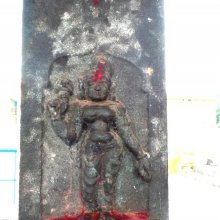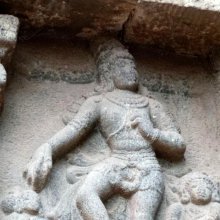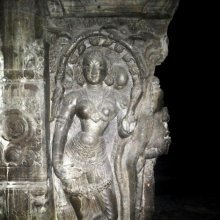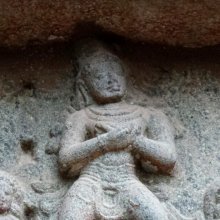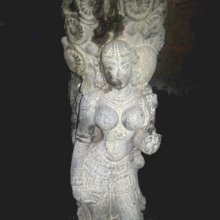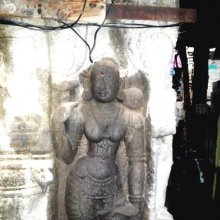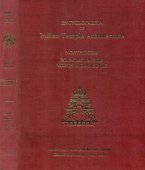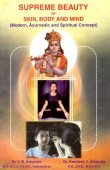Cama, Cāma, Camā: 9 definitions
Introduction:
Cama means something in Hinduism, Sanskrit, Marathi, Hindi, Tamil. If you want to know the exact meaning, history, etymology or English translation of this term then check out the descriptions on this page. Add your comment or reference to a book if you want to contribute to this summary article.
Alternative spellings of this word include Chama.
Images (photo gallery)
(+180 more images available)
Languages of India and abroad
Marathi-English dictionary
Source: DDSA: The Molesworth Marathi and English Dictionarycāma (चाम).—n (carma S) Leather. Little used but in a few compounds. 2 A piece of money, according to ēkā āṇyācē tīsa dāma ēkā dāmācē tīsa cāma. cāmācē dāma cālaviṇēṃ (To issue for circulation leathern money.) To wanton in one's power; to commit fearlessly the most arbitrary acts.
Source: DDSA: The Aryabhusan school dictionary, Marathi-Englishcāma (चाम).—n Leather. A piece of money. cāmācē dāma cālaviṇē To commit arbitrary acts.
--- OR ---
cāma (चाम).—f A louse or tick bred upon the body.
Marathi is an Indo-European language having over 70 million native speakers people in (predominantly) Maharashtra India. Marathi, like many other Indo-Aryan languages, evolved from early forms of Prakrit, which itself is a subset of Sanskrit, one of the most ancient languages of the world.
Sanskrit dictionary
Source: DDSA: The practical Sanskrit-English dictionaryCama (चम).—A Chamaka sūkta; (P.V.2.4, Vārtt.2).
Derivable forms: camaḥ (चमः).
Source: Cologne Digital Sanskrit Dictionaries: Monier-Williams Sanskrit-English DictionaryCama (चम):—m. [plural] = camaka-sūkta, [Pāṇini 5-2, 4], [vArttika] 2, [Patañjali]
[Sanskrit to German]
Sanskrit, also spelled संस्कृतम् (saṃskṛtam), is an ancient language of India commonly seen as the grandmother of the Indo-European language family (even English!). Closely allied with Prakrit and Pali, Sanskrit is more exhaustive in both grammar and terms and has the most extensive collection of literature in the world, greatly surpassing its sister-languages Greek and Latin.
Hindi dictionary
Source: DDSA: A practical Hindi-English dictionaryCāma (चाम) [Also spelled cham]:—(nm) skin; hide; —[ke dāma] lit. a leather coin—meaning a coin having no worth; earnings through immoral traffic in women.
...
Kannada-English dictionary
Source: Alar: Kannada-English corpusCama (ಚಮ):—[noun] any of several small vessels used to drink juice of the plant sōma, in a religious sacrifice.
--- OR ---
Cāma (ಚಾಮ):—[noun] Křṣṇa, whose body is black in colour.
Kannada is a Dravidian language (as opposed to the Indo-European language family) mainly spoken in the southwestern region of India.
Tamil dictionary
Source: DDSA: University of Madras: Tamil LexiconCamā (சமா) noun < Urdu jamā. Company. See ஜமா. [jama.]
Tamil is an ancient language of India from the Dravidian family spoken by roughly 250 million people mainly in southern India and Sri Lanka.
See also (Relevant definitions)
Starts with (+367): Cama-kattunilam, Cama-nilaivenpa, Cama-pataviruttam, Cama-tura-atcarekai, Cama-u, Cama-vatacaivam, Cama-vetacamavayam, Camaca, Camacagiri, Camacakkaram, Camacama, Camacamana, Camacamata, Camacamaunu, Camacamita, Camacan, Camacantiran, Camacaram, Camacarapattirikai, Camacattamam.
Ends with (+12): Acama, Adipamcama, Amrapancama, Amritapamcama, Apancama, Ardhapancama, Atmanapancama, Atmapancama, Bhinnapamcama, Camacama, Caupamcama, Jicama, Kacama, Kalyanipancama, Keke-cama-cama, Lalitapamcama, Malavapamcama, Navapancama, Nimacama, Pamcama.
Full-text (+999): Sama, Samash, Samarekha, Trisama, Samavarna, Bhashasama, Sambandhashrita-samasa, Chama, Samavedha, Samagandhaka, Samasupti, Samakara, Dvisama, Samajna, Nityasama, Acama, Camarekai, Samamaya, Camatarici, Camavayacu.
Relevant text
Search found 145 books and stories containing Cama, Cāma, Camā, Chama, Sama, Samaa; (plurals include: Camas, Cāmas, Camās, Chamas, Samas, Samaas). You can also click to the full overview containing English textual excerpts. Below are direct links for the most relevant articles:
A Manual of Khshnoom (by Phiroz Nasarvanji Tavaria)
Kirtanas of Sadasiva Brahmendra < [July – September, 1981]
The Dream Child < [September 1947]
Sri Pingaly Venkayya < [October 1969]
Parama Samhita (English translation) (by Krishnaswami Aiyangar)
From under the Dust of Ages (by William St. Chad Boscawen)
Lecture 4 - Chaldean Deluge Legend
Lecture 5 - Chaldean Libraries
The Religion and Philosophy of Tevaram (Thevaram) (by M. A. Dorai Rangaswamy)
Chapter 28 - Thiru-Venjamakoodal or Tiru-Vencamakkutal (Hymn 42) < [Volume 3.3 - Pilgrim’s progress: to Chola (later?)]
Chapter 43 - Thirunallar or Tirunallaru (Hymn 68) < [Volume 3.4 - Pilgrim’s progress: with Paravai]
Chapter 94 - Thirumuruganpoondi or Tirumurukanpunti (Hymn 49) < [Volume 3.7 - Unto the last]
Brahma Sutras (Nimbarka commentary) (by Roma Bose)
Brahma-Sūtra 3.3.63 (correct conclusion, 63-64) < [Adhikaraṇa 26 - Sūtras 59-64]
Related products
